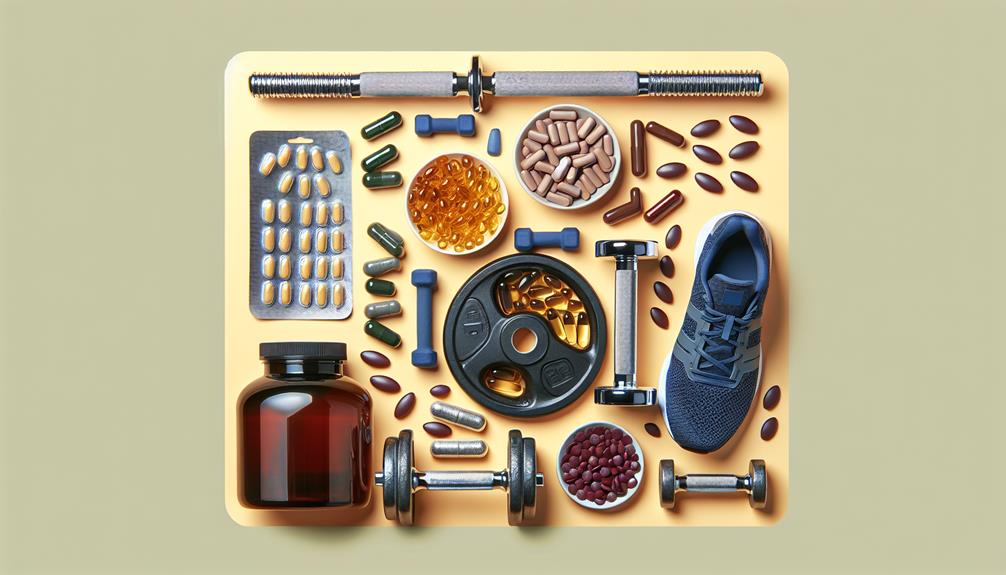You may already be familiar with the importance of vitamins and minerals in your diet, but did you know that they could significantly impact your athletic performance as well?
Discover how certain micronutrients can enhance your physical abilities and support your body's recovery process after intense workouts.
By understanding the role of specific vitamins and minerals in optimizing your athletic potential, you can take your training to the next level and achieve peak performance.
Key Takeaways
- Adequate intake of vitamins and minerals optimizes athletic performance.
- Supplements prevent deficiencies and support muscle repair and energy metabolism.
- Timing and dosage are crucial for maximizing benefits and avoiding toxicity.
- Consulting experts for personalized advice ensures safe and effective supplementation.
Importance of Vitamin and Mineral Supplementation
Why is vitamin and mineral supplementation crucial for athletes striving to enhance their performance? Athletes have increased micronutrient demands due to their rigorous training and physical exertion. Proper supplementation plays a vital role in preventing deficiencies that could otherwise impact athletic performance and overall health. By identifying individual nutrient requirements and adjusting dietary plans with supplements when necessary, athletes can ensure they meet their specific needs.
Supplementation with essential vitamins and minerals such as B vitamins, iron, calcium, and vitamin D is particularly important for athletes. These nutrients support various aspects crucial for athletic performance, including energy production, muscle function, and bone health. Balancing a nutrient-dense diet with targeted supplementation can optimize athletic performance and aid in faster recovery times for athletes pushing their bodies to the limit. It's essential for athletes to prioritize their micronutrient intake through supplementation to ensure they've the necessary support for their demanding physical activities.
Key Vitamins for Athletic Performance
Athletes can optimize their performance by understanding the key vitamins essential for metabolic reactions and muscle adaptation. Vitamins A, B6, D, E, and K are crucial for athletes as they play vital roles in these processes.
Vitamin supplementation isn't only essential for preventing and treating cardiovascular disorders but also for addressing muscle injuries that athletes may encounter. For example, vitamin A is important for muscle repair and growth, while vitamin B6 is crucial for amino acid metabolism, which is critical for proper muscle function.
It's imperative for athletes to ensure they have an adequate intake of these vitamins to support their physical performance and overall well-being. Replenishing vitamins, along with water and minerals, post-training is necessary to help athletes maintain optimal physical performance during competitions and reduce the risk of muscle injuries.
Benefits of Mineral Supplements for Athletes

Enhancing athletic performance through mineral supplements is a strategy employed by many dedicated athletes striving for optimal physical well-being and a competitive edge. Athletes have increased micronutrient needs due to intense physical activity, making mineral supplements crucial for meeting these requirements.
Adequate mineral intake supports various aspects of athletic performance, such as energy metabolism, bone health, and muscle tissue synthesis. Calcium supplementation is particularly important for maintaining strong bones, which can be obtained from both supplements and dietary sources.
Iron deficiency is a common issue among athletes and can significantly impact performance, making iron supplementation essential for those facing this challenge. In addition to calcium and iron, minerals like zinc and magnesium play vital roles in supporting overall health and maximizing athletic performance.
Timing and Dosage Recommendations
Optimizing the timing and dosage of vitamins and minerals is essential for maximizing their benefits on athletic performance and overall well-being. Timing plays a crucial role in the absorption of these essential nutrients, with experts recommending consumption with meals to enhance bioavailability.
Dosage recommendations vary depending on individual needs, but exceeding the recommended levels can lead to toxicity, highlighting the importance of understanding the appropriate amounts for your body. Athletes looking to enhance their performance should consider consulting a healthcare provider or nutrition expert to determine the optimal timing and dosage for their specific requirements.
Some vitamins and minerals, such as vitamin C and iron, may be better absorbed when taken at separate times from each other. By grasping the ideal timing and dosage of these nutrients, athletes can unlock their full potential for improved athletic performance and overall health.
Considerations for Choosing Supplements

When selecting vitamin supplements for athletic performance, it's crucial to prioritize safety verification, avoid mega-doses, and seek information from reputable sources. Safety verification ensures that the supplements meet quality standards and don't contain harmful substances. Mega-doses of vitamins can lead to adverse effects and disrupt the body's natural balance, so it's best to stick to recommended dosages.
Consulting with a sports dietitian can provide personalized advice on selecting the right supplements tailored to your needs. Daily multivitamin/mineral supplements can help fill nutrient gaps and support overall health in athletes. It's essential to focus on adjusting supplement frequency, incorporating fortified foods, and building a strong nutritional foundation for optimal performance.
Frequently Asked Questions
What Vitamin or Mineral Supplement Improve Athletic Performance?
To improve athletic performance, consider iron for preventing fatigue and enhancing oxygen transport, vitamin D for muscle strength and injury reduction, B vitamins for energy and metabolism, creatine for muscle gains, and Coenzyme Q10 for reduced fatigue and better performance.
Is Taking Vitamin and Mineral Supplements Necessary to Enhance Athletic Performance?
You don't necessarily need vitamin and mineral supplements to enhance athletic performance. A balanced diet rich in nutrients is key. Professional guidance can help determine if supplements are necessary. Excessive intake may not improve performance and can have adverse effects.
Does Multivitamins Improve Athletic Performance?
Yes, multivitamins can enhance athletic performance by supporting nutrient gaps, improving immune function, aiding in energy production, and meeting micronutrient needs. However, they should complement a balanced diet, not replace it.
How Should Athletes Obtain Vitamins and Minerals?
To get essential vitamins and minerals, athletes should focus on a balanced diet rich in nutrient-dense foods. Incorporate fruits, veggies, whole grains, nuts, seeds, and lean proteins for optimal performance. Supplements can't match the benefits of whole foods.
Conclusion
In conclusion, incorporating vitamin and mineral supplementation into your athletic routine can significantly enhance performance, recovery, and overall health.
By ensuring you have the right balance of essential nutrients, you can optimize your physical abilities and reduce the risk of injuries.
Remember to consult with a healthcare provider to determine the best supplements and dosages for your individual needs.
Keep pushing yourself to new heights with the power of vitamins and minerals on your side!
I’m not just a supplement analyst. I’m an extremely qualified one! I am a Certified Nutrition Coach (CNC) and actually received my certification directly from the National Academy of Sports Medicine. I am also a Nutrition & Wellness Consultant, certified by the American Fitness Professionals Association (AFPA).


